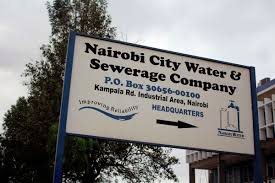Nairobi water firm on the spot for spending Sh1.2 billion in client deposits

The company collects deposits ranging from Sh2,500 for domestic connections to Sh100,000 for heavy industrial clients as a condition for access to water or sewerage services.
The Nairobi City Water and Sewerage Company (NCWSC) is under scrutiny after a government audit found it illegally spent over Sh1.2 billion in customer deposits without regulatory approval, raising concerns about its ability to refund clients and the overall state of its financial and operational management.
In a letter dated late May to NCWSC Managing Director Nahashon Muguna, the Water Services Regulatory Board (Wasreb) said the firm failed to protect customer deposits as required by law.
The findings came after an inspection Wasreb conducted between March 17 and 21 to assess NCWSC’s performance and compliance with regulatory requirements.
“The company erroneously utilised all the customers’ deposits to carry out its activities without approval from Wasreb. It does not even maintain any bank account for securing customers deposits. As of 30th June 2024, the company had basically used all the collected customers’ deposits of Sh1,229,417,698/- without approval from Wasreb,” stated Wasreb’s acting CEO Richard Cheruiyot.
The company collects deposits ranging from Sh2,500 for domestic connections to Sh100,000 for heavy industrial clients as a condition for access to water or sewerage services.
Wasreb warned that the depletion of these funds puts the company at risk of failing to honour refund obligations to clients.
The inspection further found that NCWSC is vulnerable to fraud, with several companies registered under names similar to its own.
Wasreb warned that such companies could be used to illegally acquire its resources or mislead the public.
Wasreb also raised the alarm over the ownership structure of the company, noting that two out of the 5,000 issued and paid-up shares are held by the offices of the Nairobi Governor and the County Secretary.
These are not recognised legal entities and are therefore not permitted by law to own property.
“The WSP (water service provider) has not been able to access the portal for Business Registration Services (BRS) on e-Citizen due to technical issues. As a consequence, the company is unable to file annual returns online, update its details and profile online, as required of it under the law. Fraudsters may have infiltrated the company through BRS and carried out illegal activities in its pretext,” Wasreb warned.
The audit also revealed that NCWSC lacks a valid strategic plan and business plan, meaning it is operating without a clear long-term vision. Wasreb said the company has numerous unserviceable assets, including vehicles and motorcycles, which it needs to dispose of.
In addition, NCWSC is operating without a valid water services licence from Wasreb. The last interim licence expired on December 21, 2022.
Despite repeated efforts, NCWSC did not respond to questions sent by this publication by press time. Calls and messages to the managing director, Nahashon Muguna, went unanswered. The finance director, Paul Omondi, said in a phone call on Friday, “The MD will respond to the questions.”
Wasreb also criticised the company’s handling of non-revenue water (NRW) – water that is supplied but not billed – noting that the current figure stands at 47.9 percent, almost double the acceptable limit of 25 percent.
It further pointed out gaps in how NCWSC calculates and reports NRW, suggesting possible inaccuracies.
Additionally, the regulator found that NCWSC lacks valid effluent discharge licences from the National Environment Management Authority (Nema) for its wastewater treatment facilities in Dandora (Ruai), Kariobangi, Kahawa West ponds, and Karen ponds.
It noted that the land hosting all these facilities is at risk of being encroached on or grabbed, endangering essential sewerage services for residents in Nairobi and surrounding counties.
Wasreb also criticised the company for failing to address staffing issues, highlighting the high number of employees nearing retirement and many others serving in acting capacities, including in important leadership roles.
